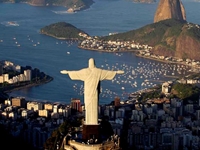Brazil’s tourist board Embratur said Thursday it had stepped up efforts to lure more foreign visitors as the Latin American giant gears up to host next year’s World Cup.
Embratur said September had seen a major publicity push worldwide, including promotions at the just-ended Japan Association of Travel Agents (JATA) showcase in Tokyo, as well as across North America and Russia.
The push for Russian business comes as the World Tourism authority placed Russian visitors as fifth on the list of global tourist spenders.
Japan is a key market not just because it will compete at the World Cup but because around 1.8 million Brazilians are of Japanese descent and Japan has its own Brazilian diaspora.
Brazil is keen to make the most of its time in the global spotlight — in 2016 Rio will host South America’s first Olympics while the World Cup sees the event return to the land of samba for the first time since 1950.
With Germany providing the most visitors from Europe — around a five percent share — Embratur said it has also held some 180 roadshows at trade exhibitions there with a particular focus on eco-and adventure tourism.
Even so it added that some three fifths of the 5.7 million tourists who visited in 2012 came for “sun, sea and sand.”
Argentinians account for the largest share in total at around 30 percent with travellers from the United States second with an 11 percent share based on 2012 figures.
The Brazilian Luxury Travel Association has focused on bolstering a US share largely comprising high-spending clients.
Away from the luxury sector, 109 new hotels, resorts and hostels are under construction across the 12 World Cup host cities, according to the tourism ministry.
Brazil hopes to lift tourist numbers to ten million by 2020, taking the share of GDP the sector accounts for directly and indirectly from a current 8.6 percent past 10 percent.
The sector contributed almost $80 billion to GDP in 2011, according to official figures, as well as almost three million jobs.
Even so, this country of more than 200 million people is racing against the clock to modernize its ageing airports and general transport as well as tourist accommodation infrastructure as the World Cup looms closer.

COMMENTS
Please let us know if you're having issues with commenting.